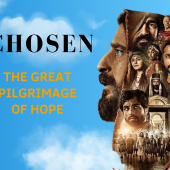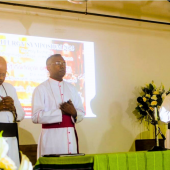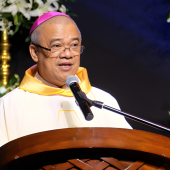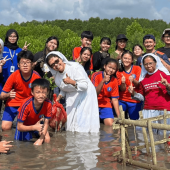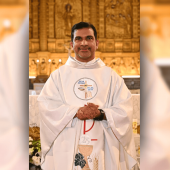‘Triple dialogue’ the lifeblood of Catholic Church in Malaysia, says Penang bishop
An Asian bishop said that “triple dialogue,” which revolves around religions, cultures, and the poor, is the “lifeblood” of the Catholic Church in Malaysia.
“That is not just a caption… but something that is part of our pastoral [work] on a daily basis,” said Penang bishop and cardinal-designate Sebastian Francis in an exclusive interview with Radio Veritas Asia.
“It is something that is not superficial or cosmetic. It is something that really is part of our daily life [and] daily bread,” he emphasized.
Bishop Francis noted that despite being a minority in Malaysia, they have fully embraced the directive given to them by the Federation of Asian Bishops’ Conference (FABC) to work with people of all faiths and walks of life.
This mission is particularly essential in their case because Malaysia is home to a huge number of local indigenous people and large communities of foreigners, mainly Chinese and Indians.
“We have been quite serious about enculturating the faith using all the local and vernacular languages,” he said.
“Modern culture must begin with language because people use the language of the heart to come closer to God… and one another,” he added.
In fact, one of the recent decisions made by the Catholic Bishops’ Conference of Malaysia-Singapore-Brunei (CBCMSB) is to promulgate the use of the Bahasa Malaysia translation of the Bible, which Bishop Francis referred to as their “unifying language.”
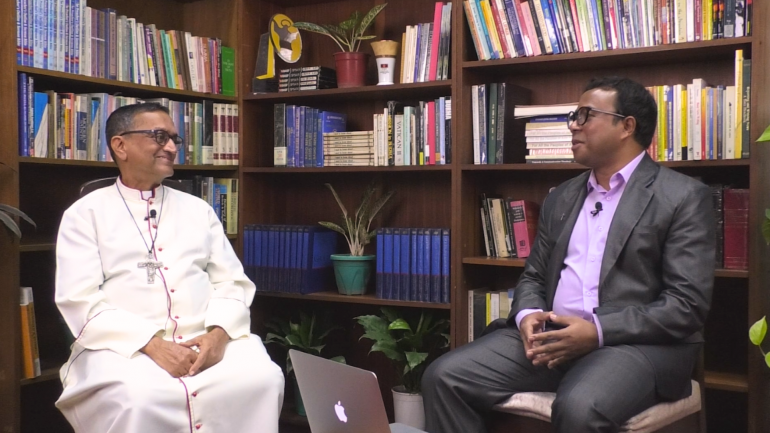
On top of that, Catholics in Malaysia have set out to build small Christian communities across the country to focus on formation as early as the mid-70s, right after the Second Vatican Council.
“We breathe [religious dialogue] every day because we are made up of all the major religions in Asia… [We] focus on unity within the Church and… on integral human development.”
Furthermore, the prelate revealed that the Catholic Church in Malaysia is very much alive and has taken its minority status as inspiration to do more when it comes to formation and evangelization.
“I would prefer to think of ourselves as a mustard seed,” said Bishop Francis. “We are small, but for us, small is beautiful… We are a sign of the presence of Jesus Christ in Malaysian life and society.”
On September 30, 71-year-old Bishop Sebastian Francis will be created cardinal by Pope Francis alongside 20 others, 11 years after his ordination into the episcopate.
The first part of the interview, in which he discusses the "lifeblood" of the Catholic Church in Malaysia, is available on YouTube: "triple dialogue," which revolves around religions, cultures, and the impoverished; the situation of the Malaysian church, which he describes as "small but beautiful as a master seed;" and his vocation as a bishop., is available on YouTube:
Read the full transcript of the interview below.
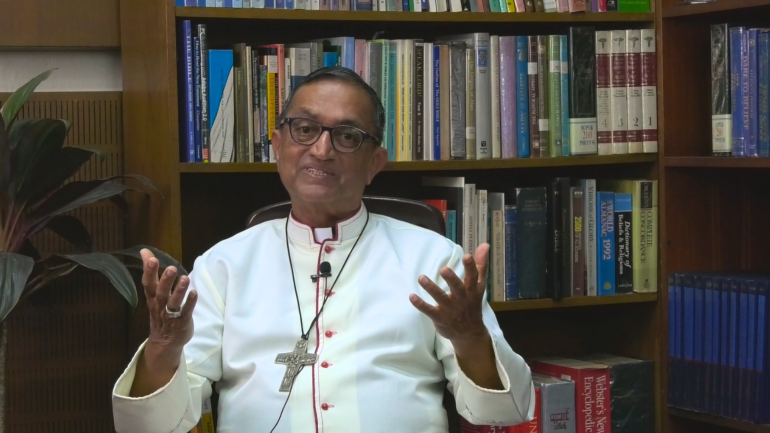
VOICE OF ASIAN BISHOPS
RVA Interview with Cardinal Elect Sebastian Francis of Penang by Fr. Kasmir Nema, SVD, from Radio Veritas Asia.
Fr. Kasmir Nema: Hello. I am Father Kasmir Nema, SVD of Radio Veritas Asia. Welcome to this special program called Conversations with Asian Bishops. It is a privilege and honor, today, we have Reverend Sebastian Francis of Penang, Malaysia. He is also head of the Bishops Conference of Malaysia, Singapore, and Brunei and is currently head of the FABC Office of Social Communication. Bishop Sebastian, welcome.
Cardinal Francis:
Thank you. Thank you.
Fr. Kasmir Nema: Let me start with this question. Malaysia is considered one of the Catholic minorities in Asia. Can you provide us with a general picture of the Catholic Church in Malaysia, and particularly your Diocese of Penang?
Cardinal Francis:
Yeah, we had nine dioceses, this in the in the country, Malaysia. Nine days. This is together with Singapore and Brunei. We make up the Catholic Bishops Conference of Malaysia, Singapore, and Brunei. That's three different independent countries. And as you said, we are a minority. But I would prefer to think of ourselves as a mustard seed. We are small, but for us, small is beautiful because we can be a mustard seed. We can be a leaven in the bread. Therefore, we are a sign of the presence of Jesus Christ in Malaysian life and society. So, we are quite comfortable being small, but small is beautiful.
Fr. Kasmir Nema: Talking about that mustard seed. Small is beautiful. What are particularly the specific ministries you offer in your diocese?
Cardinal Francis:
Well, we had our own renewal after Vatican Council – II way back in 1976. From that time, we already have set a direction to focus and building small Christian communities to focus on formation for all levels of people in the church, everybody, especially formation for the laity, young people, etc., to focus on a religious dialogue, which is, you know, we breathe that every day because we are made up of all the major religions of Asia are found in Malaysia. And also, to focus on unity within the church and finally on integral human development. So, this has been our orientation already from the mid-seventies. And we have grown slowly but consistently with this kind of direction in mind.
Fr. Kasmir Nema: Let's move to your vocation as a priest and bishop. Of course. You know, being a priest and bishop is a long journey of vocation. My question is, what motivated you to respond to God’s call, to say yes to his call? Tell us that story.
Cardinal Francis:
You know, I come from a traditional Catholic family and, you know, educated in a missionary, Catholic school. And we're surrounded by missionaries both in school as well as in the parish. We the Malaysian Church own its foundations to the French Foreign Missions Society, The French missionary fathers who came to evangelize that part of Southeast Asia. And so, you know, we interact with them almost on a daily basis, both in school and in the parish. And when you are very young, they look very exciting. These guys. They look very dynamic, you know, and they are so involved in our lives and in our families. So, I must say, it was the French missionary fathers and the Canadian brothers of Saint Gabriel that motivated me to want to be like them.
Fr. Kasmir Nema: How has it been so far, you know, as you reach 71 years, still enjoying your vocation as Bishop?
Cardinal Francis:
Well, I accepted to be a bishop about 11 years ago, and I am almost surprised that actually enjoying my vocation, my life in ministry as a bishop, because I see that we are a church that is apostolic, founded on the apostles and therefore the bishops are the successes of the apostles, and they give the unity in the local church as well as the continuity of the mission, depends to a large extent on the bishop, who is the head of the diocese and the shepherd of the diocese. So, I must say that I have grown into this life and ministry of a bishop. And I must say that I enjoy it.
Fr. Kasmir Nema: And recently you discussed the kind of new version of the Bible, that you are going to use as the official liturgy in the future. Tell us the process behind this integration into your program and what you want to gain from this new project? The fact that many non-Malaysian believers in your episcopal community may not understand the Malay language?
Cardinal Francis:
Well, Malay or Bahasa Malaysia is the national language of Malaysia. So, I think the majority of Malaysians understand the national language, which is some Malaysian or the Malay language. And it is, in my opinion, the unifying language. It is the unifying language. We have four official languages in the church in Malaysia. One is the national language, which is Malay. Second is English, of course, a third is Mandarin and the fourth is Tamil. But I think the unifying language was Malay.
So well, we depended on the Indonesian version of the Bible, which is called the Alkitab for a long time. And more recently we worked on a Malaysian version of the old the New Testament, which we call Alkitab or the Bible “Verses Borneo” because most of our Malay-speaking or national language-speaking Christians happened to be in Sabah and Sarawak, which is quite predominantly Malay speaking. So, we have adopted now this Bible verse Borneo, the Borneo version as the official Bible for the Malay, just for those who use Bahasa Malaysia, both in liturgy, in ethics and for spirituality, and for their personal lives. So that's where it stands.
Fr. Kasmir Nema: Speaking of that unifying effort now for the Bishops Conference of Malaysia, Singapore, and Brunei in FABC, you know about the famous Triple Dialogues. I believe Malaysia, Singapore, and Brunei may also have implemented this dialogue with culture, dialogue with religion, and dialogue with the poor. The question is how far you have implemented these triple dialogues in your diocese and also with the Bishops Conference of Malaysia. Singapore.
Cardinal Francis:
Yeah, that's an interesting question. And as I said, our engagement with the triple dialogue of the Federation of Asian Bishops Conference, first and foremost, we are very much one with the Federation of Asian Bishops Conference. And we have adopted the direction given to us by the Federation of Asian Bishops Conference. We are very sensitive that we are an Asian church. In fact, the tourist tag for Malaysia is Malaysia truly Asia because we have a big group of local indigenous Malays and indigenous people. We also have a very large community of Mandarin Chinese people and also Indians, and people who are familiar with the English language. So, we have really a combination of all this and therefore we have accepted the direction given to us by FABC.
Radio Veritas Asia (RVA), a media platform of the Catholic Church, aims to share Christ. RVA started in 1969 as a continental Catholic radio station to serve Asian countries in their respective local language, thus earning the tag “the Voice of Asian Christianity.” Responding to the emerging context, RVA embraced media platforms to connect with the global Asian audience via its 21 language websites and various social media platforms.









